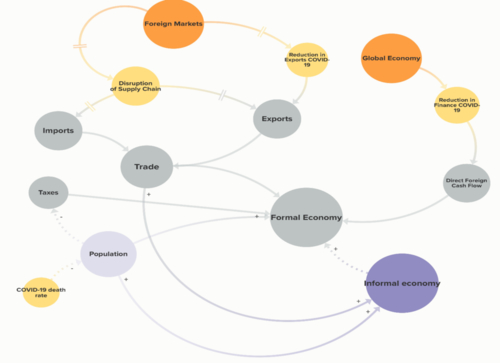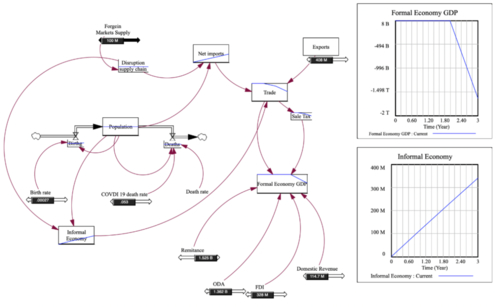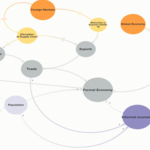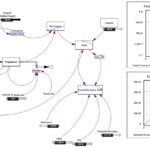As the pandemic wears on, we are fast approaching the wickedest global economic recession. In the span of weeks, countries had to make hard decisions and many complex tradeoffs. Tradeoffs between citizen’s health and their data privacy, between the pace of medical innovation and its safety and, perhaps even more poignant, between Covid and non-Covid-19 deaths.
In our view, these choices made by policymakers everywhere often fall short of drawing upon a shared understanding of the new post-pandemic realities, let alone the new unintended effects and outcomes.
A systems thinking approach to the pandemic
Systems are, by definition, profoundly interconnected. To deal with systems effectively, we need new real-time and comprehensive ways of approaching them.
Inarguably, systems thinking would come in handy to depict complex, interconnected, and ambiguous challenges — that we are used to oversimplifying in biteable linear, fragmented ones. And as the pandemic is a great reminder, that’s risky. Sherlock Holme's way of deliberately seeing with new eyes and detaching from our auto-pilot mode is especially relevant in today’s liminal space. Applying a systems thinking approach would force us to expand our view to cascading effects and interconnections.
Even more importantly, it would inspire us to think divergently and convergently at the right time in the right place— teaching us to see our old and persisting issues with new eyes, as this quote from A Scandal In Bohemia, 1891 illustrates:
Sherlock: "You see, but you do not observe. The distinction is clear. For example, you have frequently seen the steps which lead up from the hall to this room."
Watson: "Frequently."
"How often?"
"Well, some hundreds of times."
"Then how many are there?"
"How many? I don't know."
"Quite so! You have not observed. And yet you have seen. That is just my point. Now, I know that there are seventeen steps, because I have both seen and observed." Sherlock Holmes tells his chronicle Dr. Watson.
It takes deliberate mindfulness to keep observing and not dropping our guard. Deliberately observing systems at play helps us notice subtle cues and possibly pierce through the foggy and bleak pandemic aftermath. At UNDP Somalia and Morocco Accelerator Labs Accelerator Labs, we have been reflecting on the pandemic socioeconomic impact and how Somalia and Morocco are responding to the pandemic. We have been looking at how data is utilised (See examples here, here and here) and how Labs are suitable in orchestrating innovation systems.
The current crisis has shown the rigidity of systemic design
Our primary focus over these last few months has been to try to sketch out what a sustainable recovery could look like for our two countries using a systems thinking method. One of our hypotheses builds on how a systems thinking approach could help draw a recovery outline for our two countries -where millions of people are at risk of being pushed into poverty.
Perhaps the most important insight we have gained over the past months is that there are so many complex variables at play that all come together to form an impact. For this reason, when policymakers and developmental designers avoid complexity, they may ultimately reduce the impact of their work.
Why economists have a hard time
Even though economists and policymakers have usually had linear approaches in dealing with economic crises and were mostly basing their models on direct correlations between inputs and outputs, economies could not be further from being linear.
For instance, economies that rely on remittances, exports of raw resources, foreign investments, SMEs and service sectors coupled with high degrees of informality, weak public services and limited fiscal space are likely to experience additional pandemic induced complexity that results from underlying relations between factors specifically intertwined because of their underlying fragilities.
The current crisis has shown the rigidity of systemic design. The same follows in economic systems that have been made inflexible over time because of constant iterations to make them more efficient. This has made the global economy inflexible and fragile to disruption. Although the majority of the Covid-19 shocks can be felt directly in developed countries, because of the cascading effect it will be felt in developing countries and fragile states after some delay. Both our countries have either directly felt the economic shock or are on the way to feeling its full effects.
The author's abstract Systems thinking diagram of Somalia and Morocco's economies and the effects of COVID-19. The figure identifies key economic nodes: formal economy, informal economy, population and links with global economies through foreign markets (supply chains) and global economy (finance). The direct links and indirect influences are expressed by bold and dashed lines respectively.
The author's abstract System Simulation of the economic effects of Covid-19. The catastrophic downward projection in the formal economy is caused by a reduction in direct financial cash flows: ODA-Official development assistance or foreign aid, FDI-foreign direct investment, domestic revenues from taxes and tariffs and diaspora remittances. The informal economy is projected to suffer from disruptions in supply chains but will show increased inflow from the population both in terms of finance, products and services keeping cash flowing but not enough to balance overall economic activity.
How systems thinking helps
We are still wrapping our minds around how making sense of system models, such as the one above that factors the flow of liquidity into local economies in low-income countries, could help boost subsistence workers and household’s resilience to shocks. The main subsystems we identified being foreign liquidity that flows into this economy mainly through remittances, foreign investment, donors, tourism, which is a direct connection between the formal economy and global economy.
Another subsystem we identified is trade and its complex relationship between exports and imports (supply/demand) between the local economy and the global. In the subsystem above we identified as the informal economy which has a large effect on both countries. Being on the lookout of double binds that might exist in subsystems — blind to the larger system of which they are parts— would mean keeping an eye on the resulting consequences that might be negating or undermining each other. Although too slow for a pandemic since they require us to consistently tap in our slow thinking mode, a systems thinking approach would serve exactly this purpose.
Counterintuitively, Part of our fast-paced learning and sensemaking is powered by slow thinking and mindfulness. And that is precisely why Sherlock Holmes' ability to be alert and aware might help us notice connections and open our eyes to double-binds sometimes left unsolved by the linear or engineering solutions, now that business as usual is not usual anymore!
Now more than ever, we need to put together citizens and experts that span wide-ranging disciplines, whose collective — at a massive scale — wisdom and moral imagination could help uncover the nestedness and unintended consequences of new policies and disrupted citizens’ and businesses’ behaviours. They also require us to be more comfortable with ambiguity and to develop a Sherlock-esque ability to keep a lookout on connecting seemingly disconnected dots.
As for us at UNDP, we’re on a quest to shape up the future of development, stay longer with thinking about the problems and pulsejet grassroots innovators. To build back better together and greener, where digital transformation leaves no one behind, and where the value of connectivity and data can be unlocked for people who need it most, faster than ever. We’re determined to cut through complexity and keep a Sherlock-esque eye. Read more about how we apply systems thinking to do that!
— Hodan Abdullahi and Najoua Soudi
Source: apolitical.com



